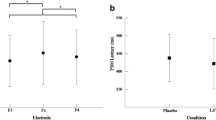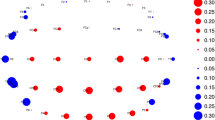Abstract
The acute effect of a single-dose of caffeine on the P300 event-related brain potential (ERP) was assessed in a study using a repeatedly presented auditory oddball button-press task. A dose (5mg/kg body-weight) of either caffeine or placebo lactose, dissolved in a cup of decaffeinated coffee, was administered double-blindly to coffee drinkers who had abstained from coffee for 24hrs, with the presentation order of the sessions counterbalanced and separated by 2–4 weeks. The caffeine-treatment condition demonstrated a smaller P300 amplitude and a shorter latency overall than the placebo treatment condition. The mean P300 amplitude value difference (caffeine minus placebo) increased with the successive trial blocks. Caffeine ingestion appears to yield a lower resource-consumption and a net increase in allocating attention resources for task performance across repeated measurements.
Similar content being viewed by others
References
Dager SR, Layton ME, Strauss W, et al. Human brain metabolic response to caffeine and the effects of tolerance. Am J Psychiatry 1999; 156: 229–37.
deVries HA. Physiology of Exercise: For Physical Education and Athletics. (4th Edition) Dubuque, Iowa: Wm.C. Brown Publishers, 1986, pp. 542–3.
Landolt H, Werth E, Borbely AA, Dijk D. Caffeine intake (200 mg) in the morning affects human sleep and EEG power spectra at night. Brain Research 1995; 675: 67–74.
Barone JJ, Roberts HR. Caffeine consumption. Fd Chem Toxic 1996; 34: 119–29.
James JE. Caffeine and health. New York: Academic Press, 1991.
Griffiths R, Woodsson P. Reinforcing effects of caffeine in humans. J Pharmacol Exp Ther 1988; 246: 21–9.
Rall TW. Central nervous system stimulants, the methylxanthines. In: Gilman AG, et al. (Eds.) The pharmacological basis of therapeutics. (7th Edition) New York: Macmillan, 1985: 589–603.
Victor BS, Lubetsky M, Greden JF. Somatic manifestations of caffeinism. J Clin Psychiatry 1981; 42: 185–8.
Penetar D, McCann U, Thorne D, et al. Caffeine reversal of sleep deprivation effects on alertness and mood. Psychopharmacology 1993; 112: 359–65.
Phillips-Bute BG, Lane-J D. Caffeine withdrawal symptoms following brief caffeine deprivation. Physiol Behav 1998; 63: 35–9.
Silverman K, Evans S, Strain EC, et al. Withdrawal syndrome after the double-blind cessation of caffeine consumption. N Engl J Med 1992; 327: 1109–14.
Lorist MM, Snel J, Kok A, Mulder G. Influence of caffeine on selective attention in well-rested and fatigued subjects. Psychophysiology 1994; 31: 525–34.
Lorist MM, Snel J, Kok A, Mulder G. Acute effects of caffeine on selective attention and visual search processes. Psychophysiology 1996; 33: 354–61.
Lorist MM, Snel J. Caffeine effects on perceptual and motor processes. Electroenceph Clin Neurophysiol 1997; 102: 401–13.
Heishman SJ, Henningfield JE. Stimulus functions of caffeine in humans: Relation to dependence potential. Neurosci Biobehav Rev 1992; 16: 273–87.
Lieberman HR, Wurtman RJ, Emde GG, et al. The effects of low doses of caffeine on human performance and mood. Psychopharmacology 1987; 92: 308–12.
Tharion WJ, Kobrick JL, Lieberman HR, Fine BJ. Effects of caffeine and diphenhydramine on auditory evoked cortical potentials. Percep Motor Skills 1993; 76: 707–15.
Lorist MM, Snel J, Mulder G, Kok A. Aging, caffeine, and information processing: an event-related potential analysis. Electroenceph Clin Neurophysiol 1996; 96: 453–67.
Smith BD, Rafferty J, Lindgren K, et al. Effects of habitual caffeine use and acute ingestion: Testing a biobehavioral model. Physiol Behav 1991; 51: 131–7.
Lammers WJ, Badia P. Habituation of P300 to target stimuli. Physiol Behav 1989; 45: 595–601.
Putnam LE, Roth WT. Effects of stimulus repetition, duration, and rise time on startle blink and automatically elicited P300. Psychophysiology 1990; 27: 275–97.
Polich J, McIsaac HK. Comparison of auditory P300 habituation from active and passive conditions. Int J Psychophysiol 1994; 17: 25–34.
Ravden D, Polich J. Habituation of P300 from visual stimuli. Int J Psychophysiol 1998; 30: 359–65.
Wesensten NJ, Badia P, Harsh J. Time of day, repeated testing, and interblock interval effects on P300 amplitude. Physiol Behav 1990; 47: 653–8.
Lew GS, Polich J. P300, habituation, and response mode. Physiol Behav 1993; 53: 111–17.
Griffiths RR, Woodson PP. Caffeine physical dependence: A review of human and laboratory animal studies. Psychopharmacolgy 1988; 94: 437–51.
Kok A. Event-related-potential (ERP) reflections of mental resources: a review and synthesis. Biol Psychol 1997; 45: 19–56.
Kramer AF, Sirevaag EJ, Braune R. A psychophysiological assessment of operator workload during simulated flight missions. Hum Factors 1987; 29: 145–60.
Polich J. Response mode and P300 from auditory stimuli. Biol Psychol 1987; 25: 61–71.
Polich J. P300 clinical utility and control of variability. J Clin Neurophysiol 1998; 15: 12–33.
Polich J, Kok A. Cognitive and biological determinants of P300: an integrative review. Biol Psychol 1995; 41: 103–46.
Filipovic SR, Kostic VS. Utility of auditory P300 in detection of presenile dementia. J Neurol Sci 1995; 131: 150–5.
Author information
Authors and Affiliations
Corresponding author
Rights and permissions
About this article
Cite this article
Pan, J., Takeshita, T. & Morimoto, K. Acute caffeine effect on repeatedly measured P300. Environ Health Prev Med 5, 13–17 (2000). https://doi.org/10.1007/BF02935910
Received:
Accepted:
Issue Date:
DOI: https://doi.org/10.1007/BF02935910




